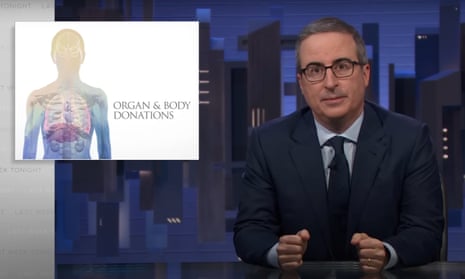John Oliver looked into the complicated and dysfunctional system of organ and whole body donations on Last Week Tonight, starting with organ transplants. The decision to donate one’s organs after death is widely popular in the US, with surveys finding 90% or more of Americans supporting it; over 42,000 organ transplants were performed in the US last year.
“But the system that handles our donations has considerable flaws,” Oliver noted on Sunday evening. The organ transplant waitlist is over 100,000 people long, with 17 people dying each day waiting for an organ transplant. Meanwhile, over 20,000 people donate their bodies each year, presumably to science but often to more dubious ends.
“The fact is, our donated organs, while being incredibly important to saving lives, are not getting to enough people, and our donated bodies, incredibly important to advancing knowledge, aren’t always treated with the care they deserve,” Oliver explained.
Oliver first dug into the history of organ transplants in the US, which is “only one Oprah old”. In 1984, the National Organ Transplant Act banned the sale of human organs and opened up access by national registry to be run by a private non-profit, United Network for Organ Sharing (UNOS), under government contract.
In theory, the UNOS donation list is a dynamic system based on what organs are available and which patients most need them. But there are multiple problems, starting with UNOS’s computer system, which suffers from aged software, periodic system failures, mistakes in programming and an over-reliance on the manual input of data.
There are also issues with how patients are ranked for need, especially for kidneys. For years, UNOS used a so-called “Black race coefficient”, “which is just as bad as it sounds”, said Oliver. Basically doctors, using racist junk science saying that Black people had more muscle mass, over-estimated their kidney function and pushed them lower down the list. The governing board of UNOS voted to eliminate race-based calculations for transplant listings last year and have given hospitals until January 2024 to update their waiting lists, “which feels like too long, considering that the correct time to fix that problem was fucking ages ago”, Oliver fumed.
Additionally, rich people can essentially cut the line by registering at multiple transplant hospitals in different states, and flying immediately to one when an organ is available. Moreover, the delivery system for organ donations relies on a primitive system of phone calls and paper manifests with no GPS or other tracking equipment. That, combined with other mistakes an airline issues, led to 170 organs unable to be transplanted over a five-year period after transportation problems.
As Dr Stuart Knechtle, an organ transplant doctor, said, comparing the process unfavorably to ordering a toothbrush on Amazon: “They can tell you minute to minute where that toothbrush is. Well, that’s not possible for organ transplantation.”
“Look, we should obviously be able to track organs as easily as we track Amazon packages,” Oliver noted. “Do you realize how shitty your organization has to be for me to say ‘be more like Amazon?’ Things have to be pretty dicey for me to look into a camera and say with my actual mouth, ‘Please be more like the soulless mega-corporation created by evil Mr Clean here.’”
UNOS now has new leadership and is piloting GPS tracking, “but these changes have been too long coming”, said Oliver.
That’s not even getting into the issue with state-level Organ Procurement Organizations (OPOs), which have their own hurdles for obtaining organs (and consent from families) and have been known to fudge data. “These are lies that actually kill people,” said Oliver. The government estimated that if OPOs increased their performance, an estimated 5,600 more organizations per year could be transplanted, “which is vital because, again, around 6,000 Americans die each year while waiting for organ transplants”, Oliver explained.
But there’s little incentive for OPOs to improve, as none have ever been decertified for poor performance.
In sum, “our system of managing donated organs is nowhere near where it should be”, said Oliver, “but depressingly, it’s actually a paragon of care and thoughtfulness compared to what happens when someone donates their body to science”.
Whole body donation is crucial to medical training but “unfortunately in practice, you might not end up in front of medical students”. Instead, you could end up at unlicensed body shows or pay-per-view autopsies, because bodies donated to science are bought and sold “in a virtually unregulated market” – there’s no federal law nor a government agency to monitor what happens to cadavers pledged for use in medical education.
Oliver ticked through necessary changes on each front. “For organs, we need to raise the standards of how the system operates,” he said, noting good news from, of all places, the Trump administration, which instituted a rule requiring an objective, not self-reported, metric for measuring the performance of OPOs. Starting in 2026, OPOs which do not meet benchmark performance will lose their certification.
This past September, Joe Biden signed a bill that would split up UNOS’s contract and allow others, including for-profit companies, to compete for parts of the services that it now provides. “Will that improve the efficiency of our national system? Let’s hope so, but the jury is currently out,” Oliver said.
And the Consensual Donation and Research Integrity Act, which would ensure bodies are not unknowingly donated to a for-profit industry, is awaiting a vote in Congress.
Despite all the issues, Oliver asserted, he still believed in organ donation, testified to the life-saving importance of such donations, and revealed that he is an organ donor himself. “When I die, and someone is in need of these sub-par organs, they can have at ‘em,” he concluded, “and nothing that we’ve researched or covered tonight, however unpleasant it’s been, has changed my mind about that decision.”
